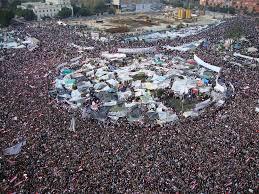
Alkarama is deeply concerned by the draft law on the "Organization of the Right to Public Assembly, Processions and Peaceful Demonstrations in Public Places" – known as 'the Demonstration Law' - which falls short of Egypt's international human rights obligations regarding the right to assembly. The draft law places unduly restrictions on the right to demonstrate and protest peacefully in Egypt and is open to grave abuses by the Egyptian authorities. Its adoption should be delayed and the law modified to reflect international standards.
The draft law would enable the authorities to ban an assembly and imposes penalties, including prison sentences, for reasons such as disrupting security, public order, crippling the interests of citizens, blocking roads and transportation. These grounds are broader than restrictions permitted under international law. They are also too vague, meaning that organizers and participants would be unable to assess whether their actions were illegal or not, and allow for abusive interpretation by courts.
In addition, the draft law fails to take into account that assemblies by their nature can lead to disruption of normal life and that the burden is on the authorities to find a balance between the conflicting interests without resorting to sweeping prohibitions.
Futhermore, the draft law does not mention nor take into account the notion of the peacefulness of assemblies as required under international law. On the contrary, the draft law seems to reverse this presumption. Sit-ins, for example, are prohibited by the draft law even though international standards set out that these falls within the framework of peaceful assembly. Furthermore, under international law, random acts of violence during a demonstration do not strip the peaceful character from a protest and should not be an excuse for the authorities to resort to restrictions under the guise of public order or collective interests. To the contrary, the state has a positive duty to protect an assembly from individuals who aim to disrupt its peaceful character.
Finally, the draft law obliges organisers to give notice of a public assembly seven days in advance. The United Nations Human Rights Committee, found, back in 1996, that this period is too long, and it should in fact be shortened to 48 hours maximum. In addition, the draft law sets out sanctions including a prison sentence and a fine for those who organize an assembly without notifying the authorities in advance; this penalty fails to take into account spontaneous or counter-demonstrations that are peaceful and cannot, by their own nature, be planned ahead of time. It must be stressed that spontaneous and counter-demonstrations too enjoy protection under international law.
Finally, Alkarama is deeply concerned by the draft law's disregard of one of the most fundamental rights in international law, the right to life. The law grants the authorities the right to use firearms "proportionately with the threat to life, objects and property." In fact, according to the Basic Principles on the Use of Force and Firearms by Law Enforcement Officials, use of force against a person can only be resorted to in "in self-defence or in the defence of others". Therefore, firearms cannot be used when there is a threat to an object or property.
As basic human rights standards have continued to be violated during peaceful protests in recent years, Alkarama has repeatedly called for accountability on the part of the Egyptian authorities. It is the disregard of these rights that led to the tragic events of Rabaa's on 14 August 2013.
This draft law, if adopted, will further pave the way for violations. The Egyptian authorities must be aware that compliance with domestic laws falling short of international standards does not render their acts legal.
"Stability in Egypt cannot be achieved through laws that sanction a well-established pattern of restrictions and violence towards peaceful means of demonstration in Egypt," said Rachid Mesli, Director of Alkarama's Legal Department. "The Egyptian authorities must break this pattern and carefully reconsider the draft before its adoption."
Alkarama sought the intervention of UN Special Rapporteur on Freedom of Assembly and Special Rapporteur on Extrajudicial Executions with the Egyptian authorities to bring the law in compliance with Egypt's international obligations.
